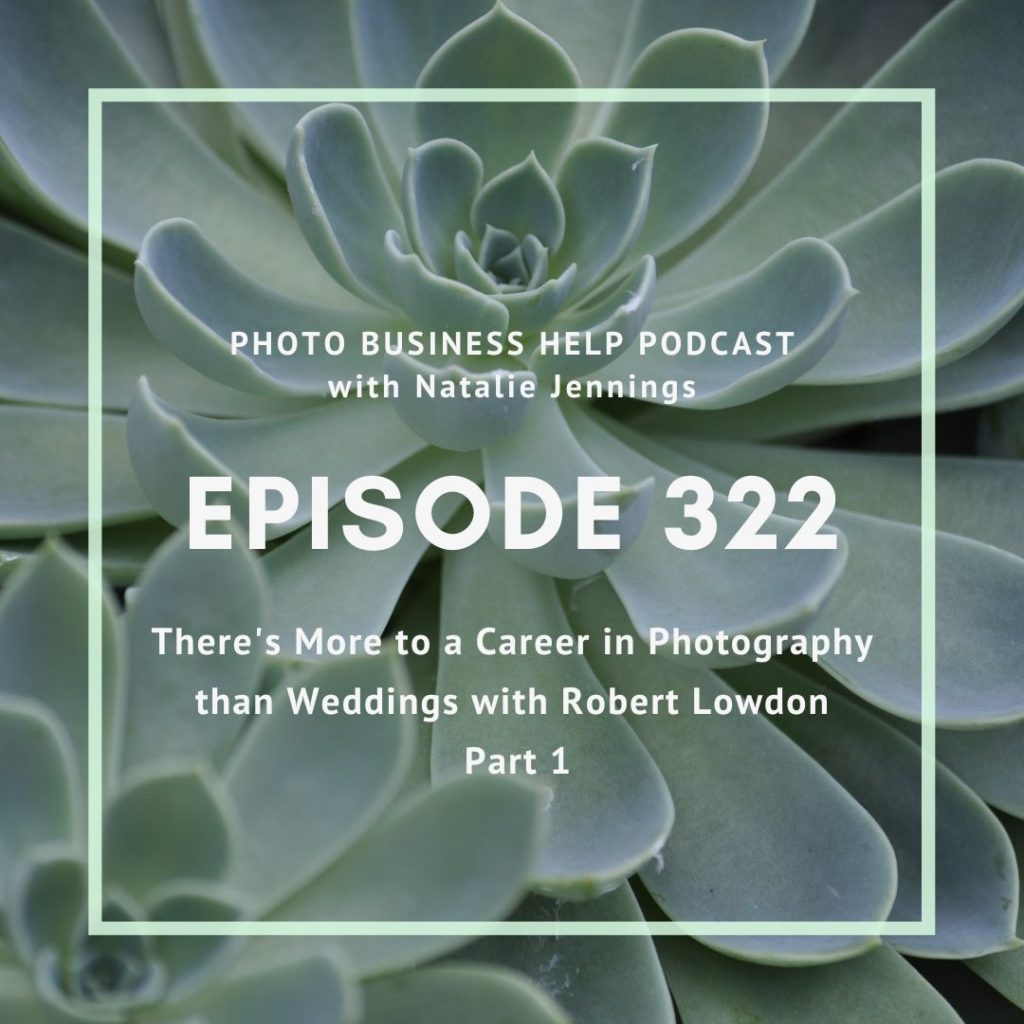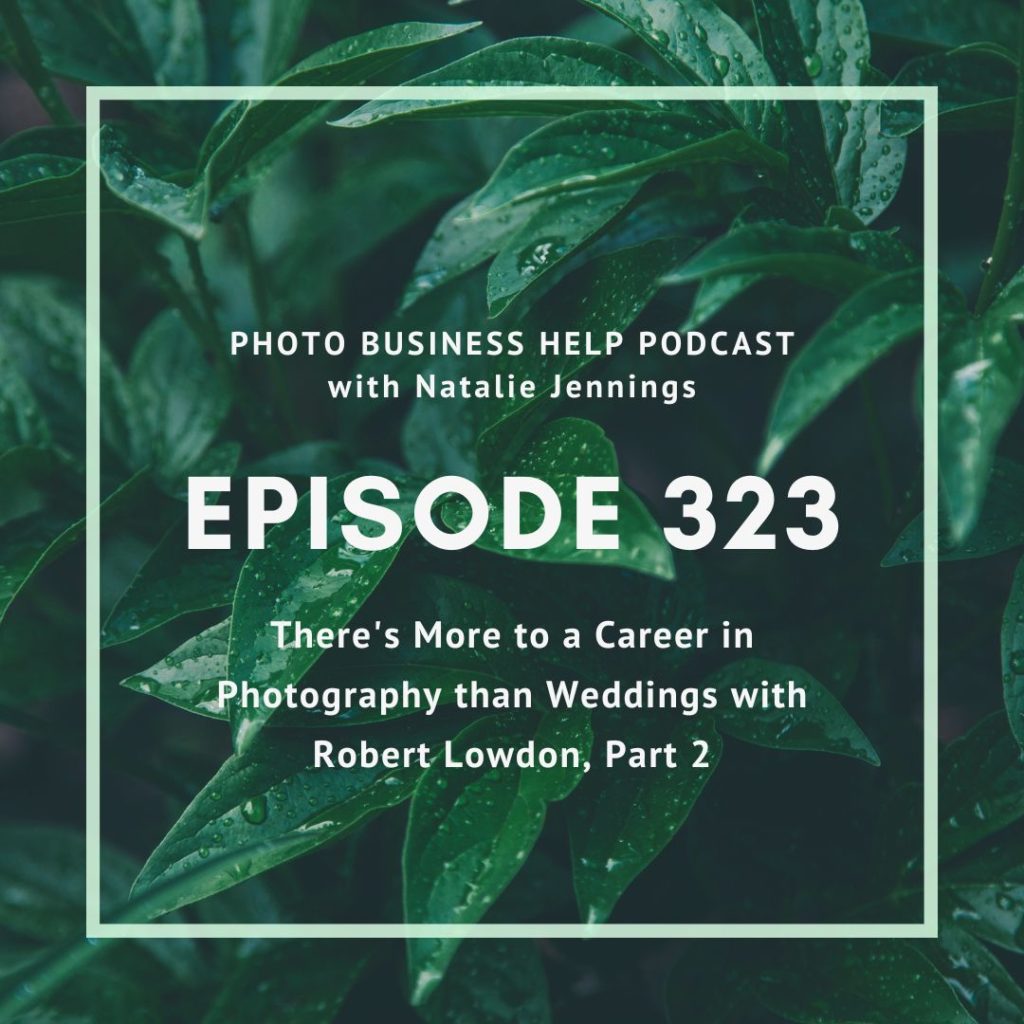This is an abridged version of my interview with Robert Lowdon, where we talk about how there's more to photography than being a wedding photographer!
Natalie: Hi, Robert, thank you so much for joining me today.
Robert: Hi, thanks for having me. I'm glad to be here.
Natalie: Yeah, absolutely. And so where are you right now in the world.
Robert: I'm in Canada. I'm in Toronto, Canada.
Natalie: So you background is in commercial photography, but I'd love for you and your own words to give people a little sense of what you're up to.
Robert: I'm basically just a commercial photographer. I work for a lot of large companies. I do industrial photography in architecture and then different construction projects. And then we do like some retail stores, stuff like that.
I do really like niche areas for some companies that are actually quite large. I have my own little area that I do is probably pretty different from the norm of what you'd expect for photographer.
Natalie: I think that's one of the reasons we wanted to connect is just, a lot of what I speak to is lifestyle photography.
I used to do weddings and now I do more branding and portraits and stuff like that. But I think there are people that are interested in kind of like the ways you can go with, with this skillset. I certainly don't think that sort of niche, industrial commercial photography is something I come across a lot.
So that'd be really cool for people to just hear kind of how you got into it. Where did all of this start?
Robert: I think it just starts where it always does. I feel like every photographer just like started shooting bands or something at one point or music or something like that. Which is definitely what I did. And then I kind of moved more towards events and then I kind of went like straight commercial from there.
I was always very, very commercial orientated. That's what I wanted to do. I really kind of stayed away from weddings. I know a lot of people, a lot of photographers go right into weddings and stuff, but I just figured for me, I wasn't that interested in weddings for some reason, even though I'm married now.
Weddings are great. But, to be honest at the time, I wasn't that interested in it. And it was really like, if you're hiring a photographer to shoot your wedding, like they better really like it. Like you want it, the photographer that loves your wedding, right?

Natalie: Or in my case, the photographer that loves telling a story. Cause I too can relate to not having a terribly big interest in weddings themselves at all, but I love, I love storytelling. So that was kind of like, it was like this perfect setup for documenting something from start to finish and literally getting to tell a story about it.
And that was, that was for me, what was really, really fun, but I just, actually, I just finished my last wedding on Friday. So 12 years later and like over 250 weddings and I'm done. So that feels really good.
I'll let you pick up from there. If you are considering going into weddings and there's nothing that you like about them, whether it's the storytelling or the event itself, it's probably important to reconsider.
Robert: No, no. And I really liked how you mentioned like the telling the stories and I think that's kind of something that just clicked in my brain when you said that, because we're really like, my company is really about, we advertise challenger stories and the reason I say it collect. I think like I was drawn cause I wanted to tell different stories and what I was seeing all the time.
And I think that's kind of probably what led me over to this direction
Natalie: Well, tell me a little bit more about what it is you actually do, so folks can get a good idea of that.
Robert: Generally, if I'm shooting industrial, I'm going to factories and then I'm following workers around or we're setting up shots in different areas and that can be anything from like a steel mill, car seat manufacturer to like any type of heavy manufacturing you wouldn't even think about like one recently we did was a foam mattresses and the company that does it, they make like all of the foam mattresses. So it's like all the ones you see on TV, I shouldn't label names just for confidentiality, but all the mattresses you see on TV.
So stuff like that, if I'm doing like logistics or trains, like on the backs of trains going down rails, taking photos, or it's really quite unique and different, like never any days are the same. I like it. It's interesting. I get to fly to different places. I get to do different things. It's pretty great.
Natalie: Yeah. So one of the things, obviously it's a photo business help podcast. And I think one of the things that I get asked that I can't speak to that I think maybe you might be able to is how does one get into this industry, or this part of the industry of photography. So do you have an agent, do you have a portfolio you pitched to people?
What happens to the photos? Who are you generally dealing with? Like the kind of backend part, part of like what you do? Like what does that look like on average?
Robert: For sure. So I don't have an agent, some of my competitors do, or other photographers that competitors have agents. For me, I think most of it is really good web presence, a little bit of social media and just doing work that attracts other work.
I know that sounds so simplistic, but that's really just what it is. Because I work with large companies. It's different than like say someone putting stuff on Instagram a lot. Like that's not really where my clients are.
It's more about showing up in places where your clients are searching for. So if you have a particular set of photos, like you want to tag those or put those in the right places.
So when people are looking for photos, they're going to find your photos and you're going to be the photographer they want. Is that kind of answer your question on that?
Natalie: Yes. I think I'm also interested in just logistically, what this looks like for people. So are you contacting CEOs? Are they contacting you? Like I know there's a lot of NDA stuff in commercial photography from the, from the small amount of commercial photography I've done. I think what happens for folks that are interested in this is they just have no idea where to start or what it even looks like. Like it's a different logistical landscape than doing like a family session, for example. So maybe speaking a little more in detail about kind of how the process works with, with you and in a new client, for example.
Robert: Yeah, for sure. I mean, to be honest, I guess I'm kind of lucky in the way that all of our clients come to us. I don't really do outreach. At all. So I guess as you break it down further, so we're talking to marketing, people are generally going to be reaching out and hiring us.
It's not really like the CEO. It'll be like director of marketing or an agency would be like the creative director or whatever. And they're really just kind of reaching out to us. So, I mean, like, it sounds very simplistic, but I guess like the best advice I could offer to people that want to get in there is to go out and shoot that work ahead of time.
And then be willing to present that work at the time comes. So if people are searching for those types of images on Google, like try to make sure you show up in Google for those images, or if they are on social media, like show those images and make your portfolio the portfolio that you think they want to hire you for.
Natalie: Those are two hugely important pieces of advice. I'm glad you brought those up. Cause like one show what you want to sell. And I really butt heads oddly, with a lot of my clients because of what you said, like someone will love an image and they'll want to show it, but they'll not want to actually have that kind of shoot attracted to them.
And so it can be a little bit of a push and pull to get people to take those images down. Cause it's like, you know, why are you showing this if you don't want to sell it? And the other piece I think was interesting is just remembering like, where are your clients?
So for you or for someone interested in doing commercial stuff, maybe it's not Instagram, but having a solid, well-put together blog with solid SEO is probably going to be a helpful thing for you. Can you speak just a little bit about like what kind of an average day or an average gig looks like for you? I've done some larger corporate and commercial things, but I think people would really want to hear it from someone that has a lot more experience like you.
Robert: Like the average day is such a thing that's like foreign to me as a photographer because there's no such thing as an average day.
Natalie: Well, in that case, I think I'm just trying to dig in a little more to just an example of a commercial situation that you've been in. Folks listening often have the background of like weddings and lifestyle stuff. So going into a setting like this is going to be like, you're still going to be a photographer, but it's a very different process from start to finish. So maybe just like a little bit about what that looks like.
Robert: For sure. I guess I'm just reminded of a project we did recently, out here it's for like the Ontario film board, which is called Ontario Creek. And what it is is they use the photos to promote the film industry here in Toronto. It's actually quite large here in Canada.

It's not like Hollywood, but it's maybe about a quarter of the way there. Anyway. So a lot of these projects, we start in a planning phase where we're doing a project management phase out of it. We're talking with the client, we're figuring out what their deliverables are, what they need, what they want and how we can pull it up.
And then we're really going back to figuring out a pricing structure that's going to work for them. So it is a little complicated off the bat, but with that type of project, it actually involved taking multiple photos of Ontario in different locations around the province over a period of time. I think it was about a few months. And with that, that is just solely, I'm heading out to take the photos myself.
I just do my thing and I give them the work and then they approve it.
Now that's pretty contradictory to like what other shoots would be like. Whereas if we look more like as an industrial type shoot, same planning phase, same client interaction, same meetings like that.
But then we're really like scheduling photo-shoot lists of what we're going to do, and a shot list. And we're coordinating with the client through there. Then we're executing those shots. I feel like I'm getting very complicated into this.
Natalie: No, this is actually perfect. This is great. This is exactly what I was looking for. And I'm curious too, when you're, when you're planning out different shots, how staged are they and how like, documentary are they in terms of like, if you're, you know, on the floor of like a steel plant, for example, like, are, are the folks just working or are you actually setting things up for certain shots?
Robert: It's honestly both. Sometimes we're pulling them away.
There is always a level of staging to every shot you see? Like, I don't think like photography really is generally that documentary, unless it's news photography, because everyone's aware that there's a camera there at all times. So it, it goes right up to complete fully stage two hours for one shot to down to maybe like 15, 20 minute shot.
But I would say generally, in my opinion, everything's staged.
Natalie: Yeah, no, that's helpful. Cause I think, I think one of the things for me that was fun about the commercial shoots I did was how I got to walk into something that was already set up and shoot it. And it was a lot of fun for me cause you know, going into like a wedding, for example, there's obviously, like you said, an element of staging and expectation that there's a camera there, but you're still not totally in control of some of the things that sometimes would be really nice to be in control of like really harsh light. You know, someone's standing in your way, et cetera.
So there's something super fun for me about exploring that style of photography, where I had a little bit more control over the actual set and setting of everything. If that makes sense. I'm not sure if you feel the same about that or how that is for you and your creative style, but I'd love to hear about that.
Robert: Yeah, for sure. You are still stuck with sometimes with the environment, machinery things, moving production. All that fun stuff.
You're very intentional in your photography and you do get to exercise your creative vision in it.
And I think that's probably one of the things I like the most about it. Over the years, it's gone from me being hired to take a specific photo for a client, for me being hired to do basically what I want to create an image for that client. So I'm getting hired as less of a picture taker and more as an artist. And for me, that's been just fantastic. And I think commercial photography is the way to go for that if you want to shoot that type of work.
Robert: Thank you for listening to part one of my interview with Robert Loudon. I hope you enjoyed that. Stay tuned for part two coming up Thursday. Hopefully you're a little bit inspired by what we got into and especially if you're feeling low about the lifestyle landscape in general. This should be the, the interview that perks you right up.

